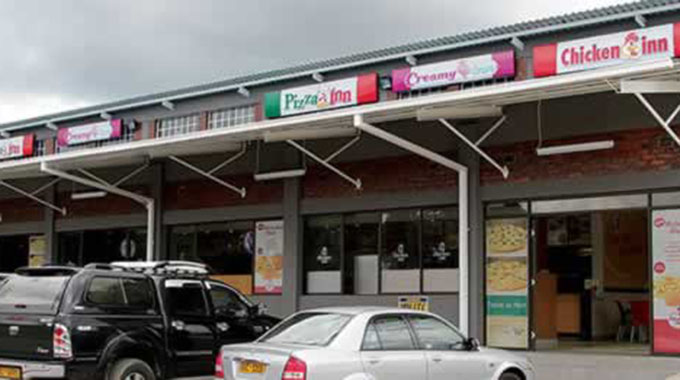
The Sunday Mail

Nelson Gahadza
INNSCOR AFRICA LIMITED says US$157 million worth of investments spread across the group’s operations in the past two years have matured; hence, the focus will be to ensure the funds deployed generate requisite returns.
The extensive capital expansion programme — which was worth US$125 million in the past two financial years, combined with a further US$32 million during the interim period to December 31, 2023 — spread across eight business units as the group sought to maintain its dominance across the market.
Innscor’s operations span across various sectors of the economy. The group engages in fast food services and the manufacture, distribution and retailing of household commodities and fresh produce.
It operates through segments: mill-bake, protein, light manufacturing and head office services.
The Mill-Bake Segment comprises the Bakery Division, National Foods, Nutrimaster, and the group’s non-controlling interests in Profeeds; while the Protein Segment comprises Colcom, Irvine’s, Associated Meat Packers, Texas Meats and Texas Chicken.
The Light Manufacturing Segment involves the production of stockfeeds, edible oils, bakers’ fats and the sale of other general household products. It is also into the production, processing and marketing of pork and related food products; and the manufacture and retail of household goods and appliances.
Additionally, it is involved in the production of chicken, table eggs and day-old chicks; down-packaging and manufacture of grocery products such as rice, candles and beverages; and the production of a variety of bags for packaging.
“Despite the macroeconomic environment, the group delivered pleasing volume growth across most business units against the comparative period, driven by a sustained recovery across the mill-bake value chain, supported by firm demand in the protein, beverage and light manufacturing segments, which all benefitted from investment activity targeted at capacity building, product extensions and venturing into new categories.
“In the six-month period under review, the group has also been actively focused on building capacity within the sales and distribution functions of consumer-facing business units,” Mr Addington Chinake, the group’s independent non-executive chairperson, said in a statement of the financials.
He said the group has remained resilient in ensuring its business models are optimised in the prevailing trading environment, supported by a drive to ensure economies of scale are unlocked across the value chain, with the objective of attaining affordable consumer pricing for all its products.
In the 2022 financial year, the group invested US$70 million on various capital projects. The additional US$56 million for the following year (FY 2023) was spent on bread delivery trucks, while another US$10 million was spent on the pasta and biscuits plant at National Food Limited.
About US$8 million was spent on beverage equipment, while the Colcom factory upgrade and the Bulawayo feed mill will cost US$7 million each.
The table egg facility upgrade and innovations at National Foods also got US$5 million each, while the Kwekwe dairy farm received US$4 million.
Innscor also invested in Buffalo Brewing Company, and the group’s entry into opaque beer has provided direct competition to Delta.
According to FBC Securities, Innscor remains well-positioned to navigate challenges presented by an uncertain global outlook and complexities in the local environment, in part due to its diversified product offering.
Additionally, it said the business operates in the consumer staples sector; therefore, demand for its products is largely sustainable even in times of an economic downturn. “The group’s overall volume trajectory remains strong, underpinned by its investment drive, with focus being deployed on expanding plant capacities, enhancing manufacturing capabilities and product extensions, as well as route-to-market initiatives that continue to be refined in order to drive volume into new markets,” the firm said.
During the period under review, the group’s revenue grew by 20,2 percent to US$480,4 million, with the growth underpinned by improved capacity utilisation across its core manufacturing entities.
Mr Chinake said this was supported by the introduction of new product categories, category extensions, route-to-market optimisation and an acute focus on pricing strategy to ensure affordability and convenience for the consumer.
He said during the period, the group has also invested considerably in the selling and distribution functions within certain key businesses, which have driven the volume and revenue performance for the group, albeit from a marginally higher cost base.
In its earning review for Innscor, IH Securities said the investments will allow the group further scope to generate revenue, as well as improve manufacturing processes and efficiencies.
“The capital expenditure programme is notably now at the tail end, paving the way for improved free cash flows in the medium term, as well as valuation. Given the current environment, management focus will continue to rest on optimising trading models,” IH said.
The firm, however, noted that consumer liquidity in the remaining half of Innscor’s financial year is projected to be constrained due to the ongoing El Niño-induced drought conditions and this will likely have a downside of slower volumes growth outside of the staples offering in the second half of 2024.
For the period under review, the Bakery Division recorded volume growth of 23,3 percent over the comparative period on account of consistent wheat pricing and innovative route-to-market initiatives, which saw the scaling up of country-wide express shops during the period under review, coupled with continued investment to replace the existing bread distribution fleet.
“The new state-of-the-art Bulawayo factory reached full capacity during the latter part of the period under review, unlocking production efficiencies and enhancing loaf quality and consistency in the Southern region.
“Investments that targeted further automation within the Harare operations were also recently commissioned,” said Mr Chinake.
National Foods registered an aggregate volume growth of 3,4 percent over the comparative period, driven by a recovery in flour volumes and continued momentum in the stockfeed business.
“The stockfeed business unit volumes grew by 14 percent over the comparative period, supported by sustained demand in both the chicken and beef feed segments.”
The group’s overall volumes within the maize business unit closed marginally behind the comparative period; however, demand for premium maize meals under the “Pearlenta” brand remained firm, with volumes closing at 7 percent ahead of the comparative period.
In the Beverage and other Light Manufacturing Segment at Prodairy, prior investments to expand capacity within the “Revive” dairy blend and “Life” steri milk categories drove overall volumes by 49 percent ahead of the comparative period.
The “Life” UHT milk category benefited from an increased raw milk supply and registered volume growth of 8 percent over the comparative period, while demand for maheu, also under the “Revive” brand, remained firm.
Probottlers aggregate volumes increased by 22 percent over the comparative period, driven by improved capacity utilisation within the “Fizzi” CSD category, where volumes closed at 20 percent ahead of the comparative period.
However, Innscor said the recently announced policy measures targeting amendments to value-added tax regulations, sugar tax and trading modalities, with the buoyant informal sector, have necessitated a sharp refocus on trading models across the group’s business units and products.
Mr Chinake said notwithstanding the direct cost-push pressure arising from this regulatory shift, the group is focusing heavily on unlocking cost savings in both the bills of materials and operating cost lines, with the objective of ensuring that product pricing remains both affordable and convenient to the consumer and that volume momentum is maintained.
“The group remains hopeful that the authorities will pursue a pathway for implementing policies that encourage more market-determined outcomes,” he said.






